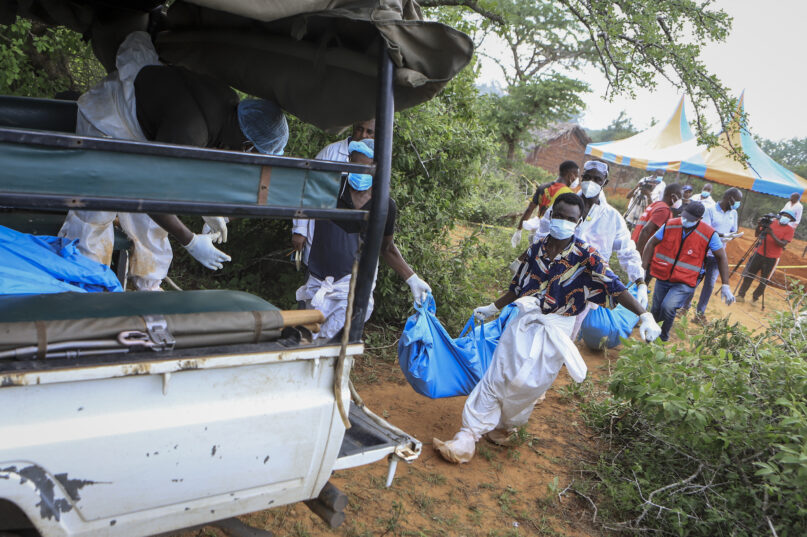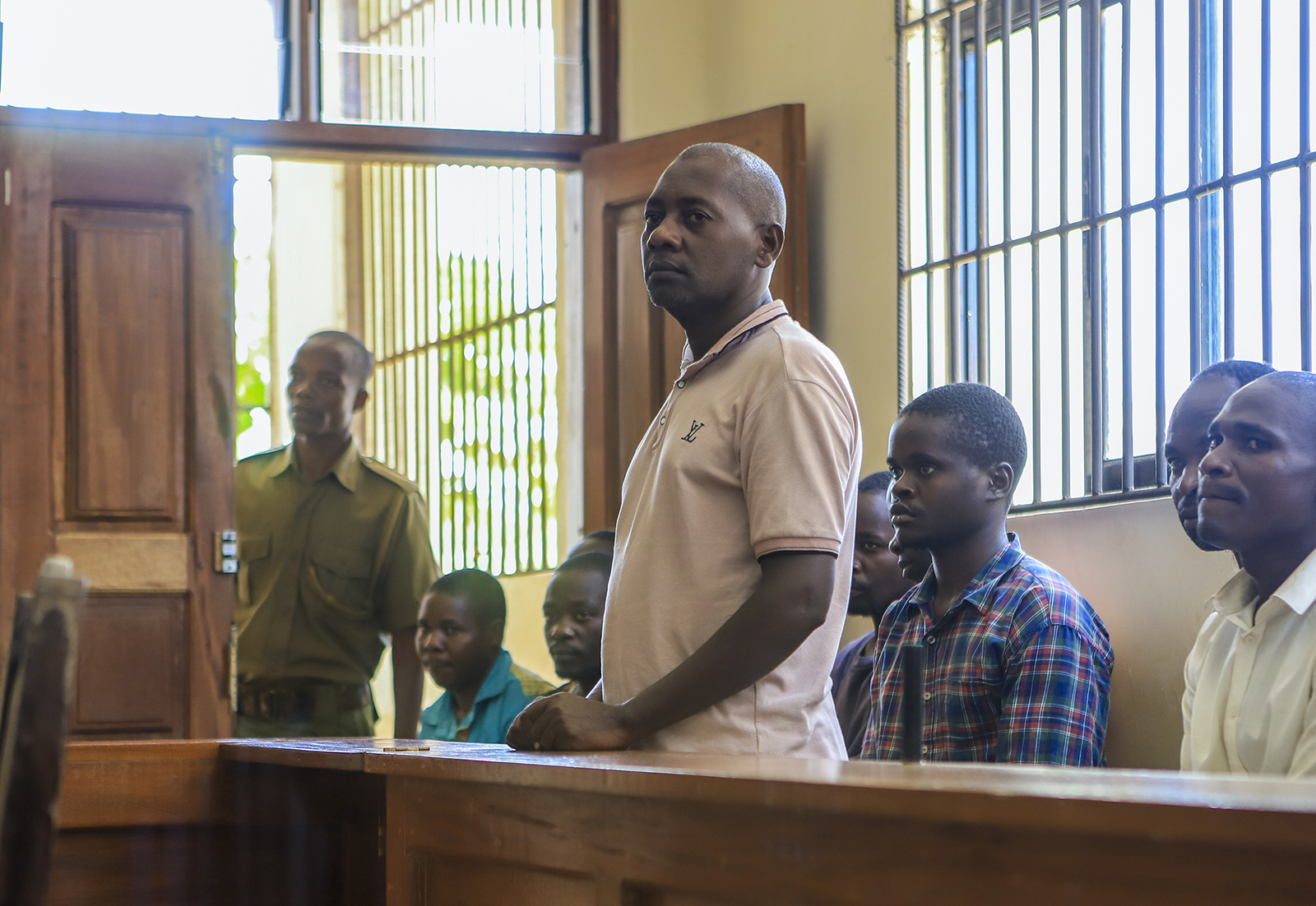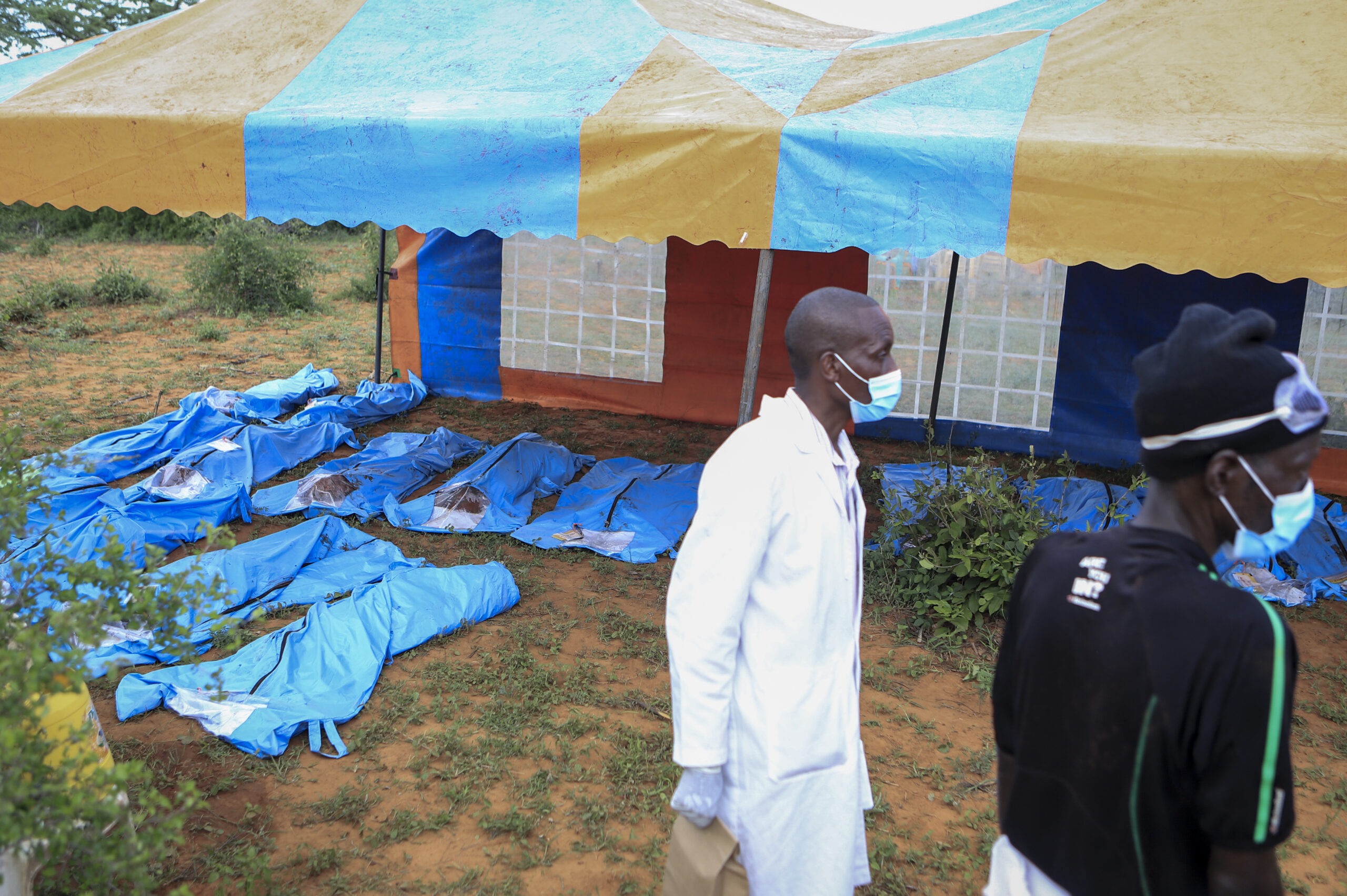As death toll mounts in Kenya church, local clergy wonder at scale of indoctrination
Most of the exhumed bodies have been children’s, but the extreme indoctrination of their parents has shocked clerics and religious analysts.

NAIROBI, Kenya (RNS) — In an expansive forest near Kenya’s southern coast, detectives have been exhuming bodies of people who starved to death to go to “heaven,” allegedly at the orders of a Christian pastor.
Anger and shock gripped the East African nation as families learned Paul Mackenzie Nthenge, the leader of the Good News International Church, ordered members to pray and fast to death so they could meet Jesus. When the people died, Nthenge and other members reportedly buried their bodies in shallow graves in Shakahola, an 800-acre forest ranch near Malindi, a tourist town on the Indian Ocean.
“Shakahola” means “a place of treating people’s problems,” according to retired Anglican Bishop Julius Kalu of Mombasa, whose home is near the area. Kalu wonders if the place’s meaning held a special appeal to Nthenge.
“When he bought the land in Shakahola, he told the people that he wanted to practice farming,” Kalu told Religion News Service.
“It got us by surprise. I do not know where he got this kind of theology. Christians pray and fast, but they don’t do it until their death,” he said. “I think we could not detect it because most of the victims are people from upcountry. The area is also sparsely populated.”
The death toll now stands at 90, with 26 new bodies exhumed Monday (April 24) from the mass graves in the ranch. Local teams anticipate more bodies in the ongoing search — the Kenyan Red Cross Society said on Sunday that 112 people had been reported missing to a tracing desk it set up near where the church was located — and Kenyans from different parts of the country have traveled to the area searching for their relatives.
Many are decrying the Good News International Church as a cult and calling Nthenge a cult leader.
“It’s indeed a worrying trend to watch how many desperate and innocent Kenyans are being spiritually terrorized or swindled by multiple fake pastors and cultic leaders,” said Roman Catholic Bishop Wilybard Kitogho Lagho of the Malindi Diocese on April 24. “What makes cultism a complicated phenomena to deal with is that cult followers believe their religious, sect or cult leader is always right, and their leader has the exclusive means of knowing ‘truth.’”

Pastor Paul Mackenzie Nthenge, who was arrested on suspicion of telling his followers to fast to death in order to meet Jesus, accompanied by some of his followers, appears at a court in Malindi, Kenya, on April 17, 2023. Kenya’s President William Ruto said on April 23, 2023, that the starvation deaths of dozens of followers of the pastor are akin to terrorism. (AP Photo)
The horrors began unfolding on April 14 when police raided the Nthenge compound on a tip that some people were starving to death there. They found 15 emaciated people, including four who later died. The survivors said they were following the pastor’s instructions to starve in order to meet Jesus.
Kenya’s President William Samoei Ruto described the incidents at the ranch as “akin to terrorism,” saying terrorists use religion to advance their heinous acts.
“People like Mackenzie are using religion to do exactly that,” said Ruto.
Religious leaders and human rights campaigners have criticized the pastor’s actions as an abuse of Kenya’s right to freedom of worship. Kenya is majority Christian: About 85% of the country’s nearly 53 million population is Christian, while about 10% are Muslim.
“While the state remains respectful of religious freedom, the horrendous blight on the conscience must lead not only to the most severe punishment, but tighter regulation of every church, mosque, temple or synagogue going forward,” said Kindiki Kithure, Kenya’s Interior Cabinet secretary.
Most of the exhumed bodies have been children’s, but the extreme indoctrination of their parents has shocked clerics and religious analysts. Many of them sold all their belongings or left good-paying jobs to join the pastor at the ranch. The promise was simple: “Come and meet Jesus and go to heaven.”
Some scholars highlight the pastor’s actions and teachings as an example of heretical Christian theology, a surging problem in Africa. Such practices arise out of Christian teachings but ignore the supremacy and sufficiency of Christ or challenge or misrepresent the divine sovereignty of God, notes the Rev. Gibson Ezekiel Lesmore, an official at the All Africa conference of Churches.
“It is an example of misleading theologies. However, it is also demonic. The pastor should be treated as a deadly criminal,” said Lesmore.

The exhumed bodies of victims of a religious cult are laid out in the village of Shakahola, near the coastal city of Malindi, in southern Kenya on April 23, 2023. Dozens of bodies have been discovered so far in shallow graves on land owned by a pastor, Paul Mackenzie Nthenge, in coastal Kenya who was arrested for telling his followers to fast to death. (AP Photo)
Media reports describe Nthenge as a dynamic and charismatic speaker and an author of books on Christian living and spirituality. He started the church in Malindi in 2003. However, he was forced out of the town in 2015 after a controversy over the kind of religious teaching he was giving to children. It was then that he settled in the forest.
In November 2019, the pastor announced the closure of the church and his digital television station, saying the message God had given him was already delivered. In May the same year, at a magistrate’s court in Malindi, he faced charges of disobeying the law, religious incitement and indoctrination of children. Earlier, he had been found with films that discouraged children from attending school. The films also incited the children against Hinduism, Buddhism and Islam. The court had released him on a Kenya Shilling 1 million bond with an alternative of 500,000 cash bail.
In 2017, police raided his church and rescued 93 children. He was arraigned in court on charges of radicalization and teaching in an unregistered school. The pastor denied the charges and was released on bond.
Nthenge demanded that his adherents stop sending their children to school and that they burn all academic certificates. He also banned women from shaving their hair and the sick from seeking treatment in hospitals. Church members were required to live on his ranch.
“We need to review the proposed state laws and amend them where necessary to ensure such rogue preachers are exposed and denied space for their dangerous activities,” said Lagho.
Kenya starvation cult 'massacre' toll hits 90 as search paused
Dylan GAMBA
Tue, Apr 25, 2023

The death toll from a suspected Kenyan starvation cult climbed to 90 on Tuesday, including many children, as police said investigators were pausing the search for bodies because the morgues were full.
The discovery of mass graves in Shakahola forest near the coastal town of Malindi has shocked Kenyans, with cult leader Paul Mackenzie Nthenge accused of driving his followers to death by preaching that starvation was the only path to God.
There are fears more corpses could be found as search teams unearthed 17 bodies on Tuesday, with investigators saying children made up the majority of victims of what has been dubbed the "Shakahola Forest Massacre".
Kenya's government has vowed to crack down on fringe religious outfits in the largely Christian country.
"We don't know how many more graves, how many more bodies, we are likely to discover," Interior Minister Kithure Kindiki told reporters, adding the crimes were serious enough to warrant terrorism charges against Nthenge.
"Those who urged others to fast and die were eating and drinking and they were purporting that they were preparing them to meet their creator."
The majority of the dead were children, according to three sources close to the investigation, highlighting the macabre nature of the cult's alleged practices which included urging parents to starve their offspring.
"The majority of the bodies exhumed are children," a forensic investigator told AFP on condition of anonymity.
- 'The horror is traumatising' -
An officer from the Directorate of Criminal Investigations (DCI) also confirmed that children accounted for more than half of the victims, followed by women.
Hussein Khalid, executive director of the rights group Haki Africa that tipped off the police to Nthenge's activities, told AFP that the cult appeared to require children to starve first, followed by women, and finally men.
He said 50 to 60 percent of the victims were children, whose bodies were found wrapped in cotton shrouds.
"The horror that we have seen over the last four days is traumatising. Nothing prepares you for shallow mass graves of children," he said.
Investigators told AFP they found bodies squeezed into shallow pits -- with up to six people inside one grave -- while others were simply left exposed in the open air.
As the fatalities mounted, the DCI officer told AFP that search teams would have to pause their efforts until autopsies were completed.
"We won't dig for a couple of days, so we have time to do the autopsies because the mortuaries are full," he said on condition of anonymity.
The state-run Malindi Sub-County Hospital had warned that its morgue was running out of space to store the bodies and was already operating well over capacity.
"The hospital mortuary has a capacity of 40 bodies," said the hospital's administrator Said Ali, adding that officials had reached out to the Kenya Red Cross for refrigerated containers.
Kindiki said 34 people had been found alive so far in the 325-hectare (800-acre) area of woodland.
It is believed that some followers of Nthenge's Good News International Church could still be hiding in the bush around Shakahola and at risk of death if not quickly found.
- 'Unacceptable ideology' -
Kenya's President William Ruto has vowed to take action against rogue pastors like Nthenge "who want to use religion to advance weird, unacceptable ideology", comparing them to terrorists.
As the investigation unfolds, questions have emerged about how the cult was able to operate undetected despite Nthenge attracting police attention six years ago.
The televangelist had been arrested in 2017 on charges of "radicalisation" after urging families not to send their children to school, saying education was not recognised by the Bible.
Nthenge was arrested again last month, according to local media, after two children starved to death in the custody of their parents.
He was released on bail of 100,000 Kenyan shillings ($700) before surrendering to police following the Shakahola raid.
Nthenge is due to appear in court on May 2.
The Kenya Red Cross said 212 people had been reported missing to its support staff in Malindi, out of which two were reunited with their families.
The case has prompted calls for tighter control of fringe denominations in a country with a troubling history of self-declared pastors and cults that have dabbled in criminality.
str-ho-dyg-amu/txw/gw
Hillary ORINDE
Tue, April 25, 2023

"Jesus told me that the work he gave me had come to an end," said Kenyan self-styled pastor Paul Mackenzie Nthenge, explaining his 2019 decision to close the Good News International Church.
But the notorious televangelist instead led his followers deep into the Shakahola forest near the coastal town of Malindi, allegedly convincing them to starve to death to meet God.
The discovery last week of mass graves topped with crucifixes -- many housing the remains of children apparently starved by their parents -- has shocked Kenya.
Yet the country is no stranger to larger-than-life pastors preaching fire and brimstone sermons and predicting the end of the world, with attempts to regulate religion running into fierce opposition in the largely Christian nation.
There are more than 4,000 churches registered in the East African country of around 50 million people, according to government figures.
Some preach the so-called prosperity gospel, urging members to donate heavily to church coffers in order to improve their own financial fortunes.
Others operate with much darker consequences.
All tend to be dominated by leaders who exercise virtually unlimited control over members' lives, twisting the Bible to promote their authority.
Nthenge's YouTube channel posted flashy videos about "demonic" practices such as wearing wigs and using mobile money to an audience of some 6,000 subscribers.
"Most of these self-styled pastors have never stepped a foot in any theological college", Stephen Akaranga, professor of religion at the University of Nairobi, told AFP.
But the lack of theological education makes little difference to their flock, he acknowledged, adding that in recent years, such churches have mushroomed across rural Kenya, "where people have little information about schooling".
- Toxic impact -
A toxic cocktail of poverty, poor education and easy access to entertaining online sermons have helped these cults thrive in Kenya, to deadly effect.
In 2018, news emerged of a family that lost seven children within four years because their organisation, Kanitha wa Ngai (Church of God), did not believe in using hospitals and modern medicine.
The same year, the Directorate of Criminal Investigations (DCI) warned citizens to watch out for a cult called Young Blud Saints targeting university students.
"Members are expected to sacrifice what they love most to prove loyalty to the organisation," the DCI said in a statement, urging "parents to keep a keen eye on their children to deter them from being recruited to such evil organisations".
But Kenyan cults have managed to evade the law even after repeatedly attracting police attention.
Nthenge himself fell foul of the law in 2017 after he was accused of urging children not to attend school, claiming the Bible did not recognise education.
He was arrested again as recently as last month, after two children starved to death in the custody of their parents.
He denied the allegations and was released on bail, meeting reporters at his Malindi home and even taking them on a tour of his church.
The grisly findings in what has been dubbed the "Shakahola Forest Massacre" case and the mounting death toll -- currently at 90 -- have prompted calls to regulate religion in Kenya.
"The horror that we have seen over the last four days is traumatising," said Hussein Khalid, executive director of the rights group Haki Africa that tipped off police about Nthenge's actions.
"Nothing prepares you for shallow mass graves of children," he told AFP.
- 'Nobody cares' -
President William Ruto has pledged a crackdown on "unacceptable" religious movements, comparing their leaders to terrorists -- a position echoed by Interior Minister Kithure Kindiki.
"What happened here in Shakahola is the turning point of how Kenya handles serious threats to security posed by religious extremists," Kindiki said Tuesday during a visit to the site.
"The purported use of the Bible to kill people, to cause widespread massacre of innocent civilians cannot be tolerated."
Even clerics have flagged the need for regulation.
"These are people who have misinterpreted and are abusing scripture rather than using them the right way," said Calisto Odede, presiding bishop of the Pentecostal denomination, Christ Is The Answer Ministries.
"We need to be able to vet the messages we are hearing from some preachers."
Efforts at regulation will likely run into stiff resistance however, with Odede saying Monday that independent churches have previously rejected suggestions on self-monitoring from the National Council of Churches of Kenya.
Fifteen people, including Nthenge, are in custody over the Shakahola deaths.
The government has threatened to charge Nthenge with terrorism, but academic Akaranga expressed doubts about whether the gruesome saga would lead to a more robust approach to cults.
"So long as you are dancing and making noise, nobody cares."
ho/amu/txw/gw

No comments:
Post a Comment